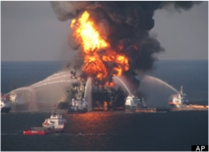BP wants $15 billion; $192 billion is more exact
by Antonia Juhasz
 For an eye-opening book of the corporate negligence and GOTUS police state collusion that went into the ‘BP Disaster,’ I recommend a quiet read of Ms. Juhasz’ groundbreaking expose, Black Tide. Irrespective of whether you’re a ‘drill, baby, drill’ cheerleader or a ‘save the baby pelicans’ bleeding heart, you will have a hard time walking away from and dismissing the wholesale criminality at BP and within the federal government that her hard-hitting journalistic account reveals. The following is excerpted from Antonia’s article in HuffPost, 6/11/12:
For an eye-opening book of the corporate negligence and GOTUS police state collusion that went into the ‘BP Disaster,’ I recommend a quiet read of Ms. Juhasz’ groundbreaking expose, Black Tide. Irrespective of whether you’re a ‘drill, baby, drill’ cheerleader or a ‘save the baby pelicans’ bleeding heart, you will have a hard time walking away from and dismissing the wholesale criminality at BP and within the federal government that her hard-hitting journalistic account reveals. The following is excerpted from Antonia’s article in HuffPost, 6/11/12:
On Friday (6/8/12), the Financial Times reported that BP is hoping to reach an agreement with U.S. authorities which would require it to pay under $15 billion to settle all criminal and civil penalties arising from the 2010 Gulf oil disaster. The Department of Justice is reportedly seeking $20 to $25 billion. Negotiations between the DOJ and BP are accelerating and “an agreement could be reached before the Democratic party’s convention in September,” the FT reported.
While $15 billion sounds like a lot of money — and it is — it is a far cry from what BP owes for the many costs associated with the largest offshore oil spill in history. To date, a full accounting of exactly what BP should owe for its crimes in the Gulf has not been made public. Such an accounting is vital if we are to ensure that justice and restoration are delivered to the Gulf Coast and that such a catastrophe never occurs again. A straightforward application of just the most pertinent U.S. laws yields a fine of $192 billion. (For simplicity sake, I only address BP’s fines.)
Sound high? Here’s why it’s not.
- Seaman’s Manslaughter Statute = $2.75 – $5.5 million—Eleven men died aboard the Deepwater Horizon: Gordon Jones, Dewey Revette, Jason Anderson, Shane Roshto, Stephen Curtis, Blair Manuel, Karl Kleppinger, Adam Weise, Don Clark, Roy Kemp, and Aaron Dale Burkeen….
- Clean Water Act: $30.5 billion—Clean Water Act (CWA): “… no discharges of oil or hazardous substances into or upon the navigable waters of the United States…”
- Alternative Fines Act (AFA)—Dr. David Uhlmann, former head of the U.S. Department of Justice Environmental Crimes Section, argues for criminal charges against BP under the CWA, making BP liable under the Alternative Fines Act (AFA) to be fined double the losses caused…
- Outer Continental Shelf Lands Act: $37 million—The Interior Department cited BP for 12 violations of drilling rules @ $35,000 per violation for 87 days = 36.54 million.
- Endangered Species Act: $284 million—Approximately 5680 injured or dead endangered or threatened species, including 100 sperm whales and over 6,000 sea turtles. @ $50,000 each = $284 million.
- Marine Mammal Protection Act: $60 million—Data from April 2011 finds 26,000 marine mammals directly injured or killed. But hundreds more dolphins have since been found…
- Migratory Bird Treaty Act: $9.4 million—Some 82,000 birds were identified as injured or dead, including more than 8,200 brown pelicans and 30,000 Laughing Gulls….
- Oil Pollution Act (OPA) = $152 Billion—Under the 1990 OPA, BP is responsible for stopping the spill; cleaning up the pollution; a Natural Resource Damage Assessment (NRDA); full environmental restoration; and full victim compensation….
- Natural Resource Damage Assessment: $62 billion ($31B x 2 [AFA]) —The NRDA process is underway and we will not know for decades the full impact of the disaster. Thus, for numbers, I turn to the National Wildlife Federation which used the Exxon Valdez settlement as precedent. Exxon paid $152 (adjusted for inflation) per-gallon of oil spilled for restoration. $152 x 4.1 million barrels of oil = $31 billion. This may be an extreme underestimation….
- Economic Loss: $79 billion ($39.7B x 2 [AFA])
- Fisheries = $30 billion—From 2009 to 2010, in Louisiana and Mississippi, oyster production fell 55% and 34%, respectively; shrimp declined in Mississippi by 52%, in Alabama by 48%, and in Louisiana, by 14%….
- Tourism = $9.7 billion—According to Oxford Economics, visitors to Congressional Districts along the Gulf coast spent in excess of $34 billion in 2008, sustaining 400,000 jobs….
- Economic Loss – Human Health: $20 billion ($10 x 2 [AFA])—More than 21 million people live along the U.S. Gulf Coast. As I reported in The Nation in May, in the wake of the disaster, acute health problems have been widely reported across the Gulf and doctors and researchers predict a host of chronic ailments….
The Gulf oil spill is the largest ecological disaster in U.S. history and the world’s largest offshore oil spill. The failures that led to this disaster are not only endemic of BP, Transocean, Halliburton, and their other Macondo partners, but they permeate the entire offshore oil industry, which has pushed beyond its own technological capacity in pursuit of profit. Fortunately, we have laws that not only punish these actions, provide for restoration and restitution, but are also designed to deter such risky and destructive activities in the future. If BP is not held to the law, then the costs of such dangerous operations will invariably be once again outweighed by the benefits.
This post has been read 3022 times!


